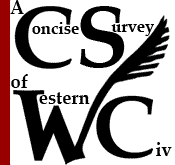Primary Sources for Chapter 15
Into the Future: The Contemporary Era, 1980 to the Present
Study Guide | Art History | Links
Geert Wilders's Speech of 6 September 2007; see also: The leader of the nationalist Party for Freedom warns against islamicization.
Content Question: What are Wilders’s concerns about the Netherlands and the West?
Analysis Questions: How does he place his analysis in a religious context? How does he use historical examples?
Evaluative Questions: Does his presentation use rhetorical exaggeration and drama or is it realistic?
Other perspectives on Islam in Europe are here (via Wayback) and here. For Geert Wilders's warning to America, see here.
Radio Address by President Clinton: the American leader explains his country’s and NATO’s involvement in Bosnia.
Content Question: What does the agreement set forth to maintain peace?
Analysis Question: How does the president justify American involvement in this issue?
Evaluative Questions: How successful has the agreement been? When and how should nations intervene should powerful states and alliances intervene in the “internal” affairs of others?
Follow-up speech a few days late text, and video.
See also: Many documents on the Cyprus Problem are to be found at the Press and Information Office for the Republic of Cyprus.
"Globalisation: good or bad?": Lewis Williamson, an editor for The Guardian, a British newspaper, creates a dialogue arguing both sides of globalization as seen in 2002.
Content Question: What are the good and the bad effects?
Analysis Question: What assumptions are behind these choices?
Evaluative Question: Which effects have become stronger or weaker in the years since this article was written?
Death of the Globalization Consensus: Harvard professor Dani Rodrick notes diverging views about the globalized economy, just at the beginning of the major collapse of 2008 [Extract of article on a blog with comments]; recently he reviewed the "lie" of globalization. Other perspectives on globalization are an NYT review of Friedman's Lexus and the Olive Tree, Wole Akande on drawbacks, a note by a capitalist on what needs fixing, a Canadian Encylcopediea article, and a meditation on globalization as a two-edges sword.
See also: some other views of globalization are offered here or here and here.
Jihad Against Jews and Crusaders: Osama bin Laden issues a fatwa against America.
Content Question: What reasons does bin Laden give for hostility toward Americans?
Analysis Question: How does he place his suggestions in a religious context?
Evaluative Questions: How justifiable is it to call the actions of either America or al Queda a crusade or jihad?
"Fight for Europe – or the wreckers will destroy it!" 30 signatory intellectuals make a plea for their vision of Europe.
Content Question: Who or what threatens Europe according to the signatories?
Analysis Question: What do the signatories think could be lost or changed in the parliamentary elections in May 2019?
Evaluative Questions: What kinds of arguments and images do the signatories offer for their appeal?
Source
Content Question: Which two events after 2019 were described as the equivalent of war?
Analysis Question: ?
Evaluative Questions: ?
Primary Source Project Links
15. The European Central Bank versus the National Front about the EUt
Sources on Families
Supreme Court of the United States, Obergefell v. Hodges (2015)
Other Sources:
Police and Protesters Clash about Macedonia Name: news story from January 2019 as debate started in the Greek Parliament. Useful map of changing borders.



